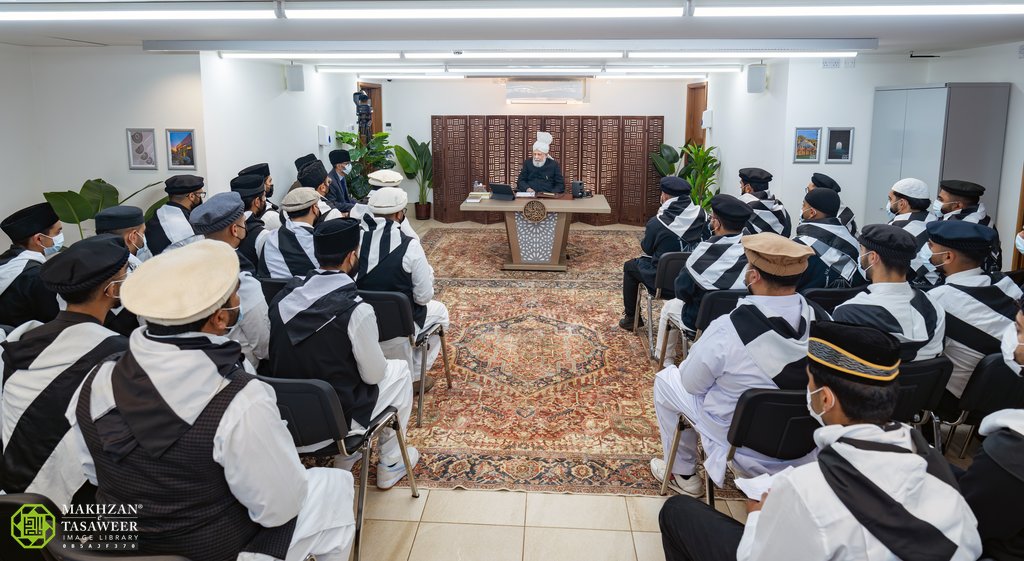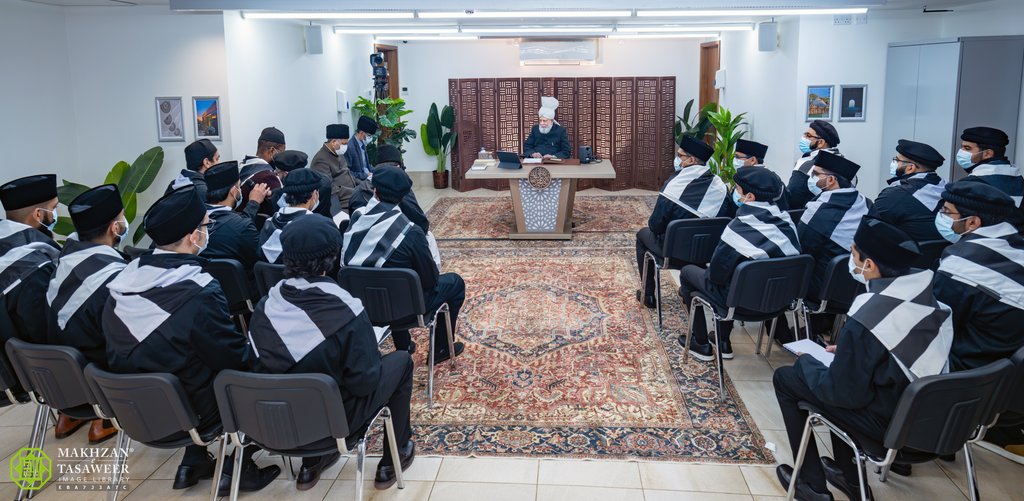
Khuddam From Germany’s Schleswig-Holstein Region Have Honour Of A Meeting With Head Of The Ahmadiyya Muslim Community
“Offer your prayers so that you may develop focus in prayer and become a grateful servant of Allah the Almighty, and you will then witness even greater blessings from Him.”
– Hazrat Mirza Masroor Ahmad
On 26 October 2025, the World Head of the Ahmadiyya Muslim Community, the Fifth Khalifa (Caliph), His Holiness, Hazrat Mirza Masroor Ahmad graciously met with a delegation of members of Majlis Khuddam-ul-Ahmadiyya (Ahmadiyya Muslim Youth Association) from Germany’s northernmost state, Schleswig-Holstein in Islamabad.
During the meeting, attendees also had the opportunity to seek the guidance and counsel of His Holiness on a range of matters.
One Khadim referred to this year’s motto of the Ahmadiyya Muslim Youth Association in Germany, ‘Prayer – A Pillar of Faith’, and asked His Holiness how, in light of this theme, one can develop and instil a true love for prayer in the heart.
Hazrat Mirza Masroor Ahmad stated:
“Allah the Almighty says that He is the ‘Lord of all the worlds’ and the Provider of all things… If a person gives you something, speaks in your favour, or benefits you in some way, you show them gratitude. Thus, Allah the Almighty says that He created this world; He provided sustenance for your nourishment while you were still in your mother’s womb so that a healthy child could be born. Then your parents nourished you and provided for you. And when you grew up, you were given the opportunity to seek an education – your parents clothed you and enabled your studies. In reality, Allah the Almighty provided all these things. He is the One Who taught people everything, so one should show gratitude to Him…. And Allah the Almighty says that the best way to show gratitude is through prayer.”
Hazrat Mirza Masroor Ahmad continued:
“Offer your five daily prayers, seek Allah the Almighty, and express gratitude to Him. Allah the Almighty states in the Holy Qur’an, ‘If you are grateful to Me, I will bestow more favours upon you’ – even greater than before. Allah the Almighty says that He is not in need of our gratitude or worship, but that if we do offer them, He will increase us in blessings. Therefore, keeping this in mind, offer your prayers so that you may develop focus in prayer and become a grateful servant of Allah the Almighty, and you will then witness even greater blessings from Him.”
Another attendee mentioned that, after marriage, one’s relationship and closeness with siblings can sometimes diminish, occasionally even leading to disagreements. He asked His Holiness for guidance on how to maintain love and unity with family members after marriage.
Hazrat Mirza Masroor Ahmad stated:
“Allah the Almighty instructs us to fulfil the rights of everyone. He commands us to uphold the rights of your parents, your siblings, and your wife – who is someone’s daughter. In my addresses at the Jalsa Salanas (annual conventions), I have compiled a list of the rights owed to others and spoken on them over the two or three years and some more rights remain (to be addressed). If a person resolves to fulfil everyone’s rights, disagreements will not arise. Moreover, it is important to pray that Allah the Almighty instils a love in our hearts that cannot be extinguished – a love that enables us to fulfil the rights of our siblings.”
Hazrat Mirza Masroor Ahmad continued:
“Your brothers and sisters should also recognise that you are now married and understand that you are making adjustments in your life upon taking a wife. Likewise, before joining you in marriage, your wife should also be aware of how to adjust herself within her new household. You, too, should be conscious of how to fulfil the rights of your wife as well as the other members of your household. Act with wisdom, control your emotions, strive to display good character, and include all of this in your prayers. Allah will then bestow His blessings.”
Following this, one attendee mentioned that some scientists believe the cosmological event of the ‘Big Crunch’ could bring an end to the universe and asked His Holiness how Islam views this theory in light of its teachings on the Day of Judgment.
Hazrat Mirza Masroor Ahmad stated:
“In Surah al-Anbiya (Chapter 21 of the Holy Qur’an), there is a reference to the Big Bang. Allah the Almighty says that He will roll up the layers — in the way one tightly rolls up paper — and all things will be rolled up to enter the Black Hole on the Day of Judgement. Regarding the Big Bang, Allah the Almighty stated that everything was once a closed-up mass, which He then opened out, creating the various planets we observe in the universe. The Holy Qur’an thus mentions that not only did the Big Bang happen but that a time will come when everything will be consumed by the Black Hole on the Day of Judgement. Islam provides a detailed explanation of this, which can be found in the commentary of Surah al‑Anbiya. Studying these verses will allow a deeper understanding of these phenomena. Islam teaches that science reflects the action of Allah the Almighty, and worldly knowledge is ultimately the knowledge of Allah the Almighty.”
Building on the connection between science and religion, His Holiness shared an experience from his visit to Australia, where he met a Christian priest who believed that science has no relation to religion. In response, His Holiness said, “Science and religion go hand-in-hand.” He explained that knowledge of science has been bestowed upon humankind by Allah the Almighty, who has provided practical evidence of it in the world, while religion guides humans in spiritual progress, for which Allah the Almighty has also granted knowledge. His Holiness then told the priest that all of this is already written in the Holy Qur’an, shared relevant references, and presented him with a copy of the Qur’an. Upon hearing this, the priest remarked in surprise, “So the Qur’an has written all this (scientific principles), while no other religion mentions it.”
An attendee asked His Holiness whether it would be correct to assume that a person’s spiritual progress is limited if, despite striving and achieving advancement for a time, they repeatedly return to their previous ways.
His Holiness explained that when one recites in the opening chapter of the Holy Qur’an, “Guide us in the right path, the path of those on whom Thou hast bestowed Thy blessings”, one is essentially seeking guidance and protection from repeatedly falling into error.
Hazrat Mirza Masroor Ahmad stated:
“When a person reaches the stage of Nafs-e-Mutmainnah (the soul at rest), one ceases to falter. One should strive to attain this state repeatedly, progressing from Nafs-e-Lawwama (the reproving self) to Nafs-e-Mutmainnah. When one falls short, the heart reproaches itself for inadequacies in prayer or shortcomings in spiritual efforts — this is known as Lawwama. One should then supplicate to Allah to improve oneself and offer voluntary prayers. Effort should be made to guard against worldly distractions, temptations, and misplaced focus, while sincerely supplicating to Allah the Almighty for guidance, which He accepts. Similarly, the Promised Messiah (peace be upon him) has also spoken about Istighfar (seeking forgiveness). The purpose of Istighfar is to prevent future sins and safeguard one’s spiritual state from deterioration. Thus, Istighfar is of great importance, which is why it is emphasised to perform it regularly, as I have previously instructed the Ahmadiyya Muslim Community on multiple occasions.”
Hazrat Mirza Masroor Ahmad continued:
“Do not let fatigue cause you to sit idle – nowhere does Allah the Almighty say that you should do this. Allah the Almighty is Most-Benevolent. God Almighty states that when a person performs a good deed, He rewards it tenfold, whereas for a sin, one receives recompense equal to it… Thus, if you continuously strive to maintain a relationship with Allah the Almighty, He will ensure that you do not falter and reward your efforts.”
Towards the end of the meeting, one attendee noted that in today’s world, social media and worldly distractions can divert attention from faith and sought His Holiness’ guidance on how to maintain a strong connection with Allah in light of this.
His Holiness explained that social media can be beneficial if only used to stay informed about world affairs or to access informative material, rather than becoming engulfed by its many vices. He emphasised the importance of seeking repentance (Istighfar) and praying to Allah the Almighty. One should also cultivate a firm resolve to avoid being distracted by social media, television, or other worldly temptations, particularly during times of prayer. His Holiness reminded that the Holy Prophet Muhammad (peace and blessings of Allah be upon him) stated that the first question on the Day of Judgement will concern the offering of one’s obligatory prayers. By striving to preserve prayers, seeking repentance, and using social media wisely, one can safeguard one’s faith against these distractions.
His Holiness further cautioned that, while navigating online content, one link can lead to another, and even children’s programmes can be interrupted by inappropriate ads, which can pollute and poison young minds. He advised monitoring children’s online activities, especially considering how far AI may have advanced by the time children grow up, and using these tools to one’s benefit while avoiding their potential harms.
The meeting concluded with group photos, after which His Holiness graciously distributed pens to the attendees. His Holiness then conveyed his greetings, marking the end of the session.
